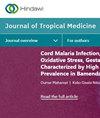Metabolomic Analysis of Key Regulatory Metabolites in the Urine of Flavivirus-Infected Mice
IF 2.1
4区 医学
Q3 PUBLIC, ENVIRONMENTAL & OCCUPATIONAL HEALTH
引用次数: 0
Abstract
Objective Dengue virus (DENV), Japanese encephalitis virus (JEV), and Zika virus (ZIKV) are several important flaviviruses, and infections caused by these flaviviruses remain worldwide health problems. Different flaviviruses exhibit different biological characteristics and pathogenicity. Metabolomics is an emerging research perspective to uncover and observe the pathogenesis of certain infections. Methods To improve the understanding of the specific metabolic changes that occur during infection with different flaviviruses, considering the principle of noninvasive sampling, this article describes our comprehensive analysis of metabolites in urine samples from the three kinds of flavivirus-infected mice using a liquid chromatography tandem mass spectrometry method to better understand their infection mechanisms. Results The urine of DENV-, JEV-, and ZIKV-infected mice had 68, 64, and 47 different differential metabolites, respectively, compared with the urine of control mice. Among the metabolic pathways designed by these metabolites, ABC transporters, arginine and proline metabolism, and regulation of lipolysis play an important role. Furthermore, we predicted and fitted potential relationships between metabolites and pathways. Conclusions These virus-specific altered metabolites may be associated with their unique biological properties and pathogenicity. The metabolomic analysis of urine is very important for the analysis of flavivirus infection.黄病毒感染小鼠尿液中关键调控代谢产物的代谢组学分析
目的登革热病毒(DENV)、日本脑炎病毒(JEV)和寨卡病毒(ZIKV)是几种重要的黄病毒,由这些黄病毒引起的感染仍然是世界范围内的卫生问题。不同的黄病毒具有不同的生物学特性和致病性。代谢组学是揭示和观察某些感染发病机制的新兴研究视角。方法为了更好地了解不同黄病毒感染过程中所发生的特异性代谢变化,考虑到无创采样的原则,本文采用液相色谱串联质谱法对三种黄病毒感染小鼠尿液样本中的代谢物进行了综合分析,以更好地了解它们的感染机制。结果与对照组相比,DENV-、JEV-和zikv -感染小鼠尿液中差异代谢物分别为68、64和47种。在这些代谢物设计的代谢途径中,ABC转运体、精氨酸和脯氨酸代谢以及脂肪分解的调节起着重要作用。此外,我们预测并拟合了代谢物和途径之间的潜在关系。结论这些病毒特异性代谢产物的改变可能与其独特的生物学特性和致病性有关。尿液代谢组学分析对黄病毒感染的分析具有重要意义。
本文章由计算机程序翻译,如有差异,请以英文原文为准。
求助全文
约1分钟内获得全文
求助全文
来源期刊

Journal of Tropical Medicine
Immunology and Microbiology-Parasitology
CiteScore
3.90
自引率
4.50%
发文量
0
审稿时长
14 weeks
期刊介绍:
Journal of Tropical Medicine is a peer-reviewed, Open Access journal that publishes original research articles, review articles, and clinical studies on all aspects of tropical diseases. Articles on the pathology, diagnosis, and treatment of tropical diseases, parasites and their hosts, epidemiology, and public health issues will be considered. Journal of Tropical Medicine aims to facilitate the communication of advances addressing global health and mortality relating to tropical diseases.
 求助内容:
求助内容: 应助结果提醒方式:
应助结果提醒方式:


